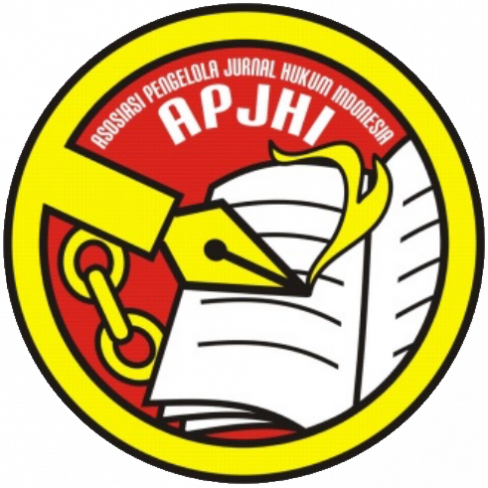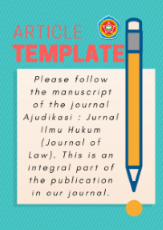Faktor Penyebab Terjadinya Perceraian di Pengadilan Agama Serang
DOI:
https://doi.org/10.30656/ajudikasi.v7i2.7520Keywords:
Divorce, Due to divorce, Religious CourtsAbstract
Divorce is the final point of a marriage that is unable to achieve the noble goal of family happiness as expected by every married couple. This study aims to find out about the factors that cause divorce in the Serang Religious Court. To achieve these objectives, the researchers used descriptive research with a qualitative approach. Informants in this study were judges, junior clerks and Posbakum. Data collection was carried out using the method of observation, interviews and documentation. The data analysis technique used is data reduction, data presentation and conclusion. Based on the research results, it was found that the highest causes of divorce in the Serang Religious Courts were (1) Continuous Quarrels and Disputes (47%), (2) Economics (36%), (3) Domestic Violence (12%), (4) Leaving one of the parties (5%), and the consequences of divorce are very broad and complex, because it is not only the divorced husband and wife who feel the consequences of the divorce but also the impact on children and wealth.
Downloads
References
Buku
Arikunto. (2006). Prosedur Penelitian Suatu Pendekatan Praktik, Jakarta: Rineka Cipta
Beni. A. Sabeni. (2008). Perkawinan dan Hukum Islam dan Undang-undang . Bandung : Pustaka Setia
Dodi Ahmad Fauzi. (2006). Perceraian siapa takut. Malang : Restu Agung
Djamaan Nur. (1993). Fiqih Munakahat. Semarang : Dina Utama Semarang.
Marzo’atus, sa’adah. (2022). Pergeseran Penyebab Perceraian Dalam Masyarakat Urban. Lamongan : Academia Publication
Muhammad, Syaifuddin. (2013). Hukum Perceraian. Jakarta: Sinar Gravika
Moleong, Lexy J. (2014). Metodologi Penelitian Kualitatif Revisi. Bandung: PT.Remaja Rosdakarya
Pusat Bahasa, (2008), Kamus Besar Bahasa Indonesia. Jakarta : PT Gramedia Pustaka Indonesia
RI, Mahkama Agung, (2011). Himpunan Peraturan Perundang-undangan yang Berkaitan dengan Kompilasi Hukum Islam. Jakarta : Perpustakaan Mari
Sabiq, Sayyid. (1986). Fiqih Sunnah. Bandung : Alma & apos
Subekti, Tjitorosudibio. (2001). Pokok-pokok Hukum Perdata. Jakarta : Intermasa
Sugiyono. (2007). Metode Penelitian Pendidikan: Pendekatan Kualitatif, Kuantitatif, dan R&D. Bandung: Alfabeta.
Sugiyono. (2013). Metode Penelitian Pendidikan: Pendekatan Kualitatif, Kuantitatif, dan R&D. Bandung: Alfabeta.
Jurnal Ilmiah
Anton Aulawi, SHI.,. (MH. 2018). PENELANTARAN RUMAH TANGGA SEBAGAI BENTUK KEKERASAN MENURUT UNDANG-UNDANG NO. 23 TAHUN 2004 (Kajian Penelantaran Rumah Tangga Sebagai Penyebab Terbesar Perempuan Mengajukan Gugatan Cerai Di Pengadilan Agama Serang). Vol. 1, No.1
Direktorat Jendral Pembinaan Agama Islam. Departemen RI_2001. Bahan Penyuluhan Hukum. Jakarta: Departemen Agama RI_
Direktorat Pembinaan Badan Peradilan Agama 2000. Kompilasai Hukum Islam di Indonesia. Jakarta: Direktorat Jendral Pembinaan Kelembagaan Agama.
Skripsi/Tesis
Humairah, Resty. (2016). Dampak Perceraian Terhadap Kondisi Psikologis Keluarga (Studi Deskriptif Analitis Di Kec.Tangan-Tangan Kab.Aceh Barat Daya). Aceh : Universitas Islam Negeri (Uin) Ar-Raniry Darussalam. Banda Aceh
Setiyowati, Erna. (2011). Fenomena Meningkatnya Perkara Perceraian Di Kalangan Pegawai Negeri Sipil ( Studi Kasus Di Pengadilan Agama Ngawi). Malang: Universitas Islam Negeri Maulana Malik Ibrahim. Malang.
Saidan, Muh. (2014). Analisis Faktor-faktor Penyebab Terjadinya Perceraian di Pemkot Surakarta Tahun 2013-2014 (Studi Kasus di Pengadilan Agama Surakarta). Surakarta : Universitas Muhammadiyah. Surakarta.
Peraturan Perundang-undangan
Undang-Undang No.16 tahun 2019 tentang perkawinan.
Undang-Undang No.14 tahun 1970 tentang Pokok-pokok kekuasaan perkawinan.
Undang-Undang No. 7 tahun 1989 tentang Peradilan Agama.
Peraturan Pemerintrah No.9 tahun 1975 tentang Pelaksanaan Undang-undang Nomor 1 tahun 1974 tentang perkawinan.
Downloads
Published
Issue
Section
License
Authors who publish with this journal agree to the following terms:
Authors retain copyright and grant the journal right of first publication with the work simultaneously licensed under a Creative Commons Attribution License that allows others to share the work with an acknowledgment of the work's authorship and initial publication in this journal.
Authors can enter into separate, additional contractual arrangements for the non-exclusive distribution of the journal's published version of the work (e.g., post it to an institutional repository or publish it in a book) with an acknowledgment of its initial publication in this journal.
Authors are permitted and encouraged to post their work online (e.g., in institutional repositories or on their website) before and during the submission process, as it can lead to productive exchanges and earlier and greater citation of published work.
All articles in Ajudikasi : Jurnal Ilmu Hukum can be disseminated provided they include the identity of the article and the source of the article (Ajudikasi : Jurnal Ilmu Hukum). The publisher is not responsible for the contents of the article. The content of the article is the sole responsibility of the author
Ajudikasi : Jurnal Ilmu Hukum is lincensed under a Creative Commons Attribution-ShareAlike 4.0 International License.









1.png)
.png)
.png)





.png)
.png)
.png)
.png)





.png)







